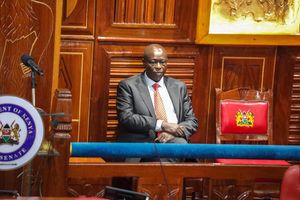Gender equality remains a distant dream, 2024 report projects

A boy and a girl play. The Gender Snapshot 2024 shows none of the indicators and sub-indicators of Sustainable Development Goal 5 is being met
What you need to know:
- At current rates, gender parity in Parliament remains a distant dream, potentially not achievable before 2063.
- The report adds it will take a staggering 137 years to lift all women and girls out of poverty.
Prior to the 2022 General Election in Kenya, women leaders were optimistic that the two-thirds gender rule would finally be achieved at the ballot.
They hoped that they would finally achieve gender parity in the august House, something that has never happened since Independence. However, to their disappointment, the polls did not help cure the gender rule impasse in elective politics.
According to the analysis by the National Gender and Equality Commission, of the 290 constituencies, less than 30 women lawmakers were elected. Only 26 females won to represent single-member constituencies, up from 23 in 2017. The percentage of women in the National Assembly now stands at 23.3 per cent. This is a 30 per cent increase in the number of women elected from the single constituencies. In 2017, only 23 women were elected.
In the Senate, only three women were elected out of the 47 counties. And even if the 2022 elections marked the highest number for women to ever be elected, the two thirds gender principle has yet to be adhered to in elective positions despite affirmative action.
The Gender Snapshot 2024 shows none of the indicators and sub-indicators of Sustainable Development Goal (SDG) 5 (gender equality) is being met. At current rates, gender parity in Parliament remains a distant dream, potentially not achievable before 2063.
It will take a staggering 137 years to lift all women and girls out of poverty. And about one in five girls continue to be married as children. The survey shows that countries with domestic violence legislation have lower rates of intimate partner violence at 9.5 per cent compared to 16.1 per cent for those without.
The Gender Snapshot 2024, launched by the UN Women Department of Economic and Social Affairs, however, reveals that progress has been made worldwide on gender equality and women’s and girls’ empowerment. Women hold one in every four parliamentary seats, a significant rise from a decade ago.
The share of women and girls living in extreme poverty has finally dipped below 10 per cent following steep increases during the Covid-19 years. Up to 56 legal reforms have been enacted worldwide that seek to close the gender gap since the first gender Snapshot. However, the data from the report shows that none of the indicators and sub-indicators of SDG 5 is being met.
“Today’s report reveals the undeniable truth: progress is achievable, but is not fast enough. We need to keep pushing forward for gender equality to fulfil the commitment made by world leaders in the Fourth World Conference on Women held in Beijing almost 30 years ago and the 2030 Agenda. Let us unite to continue dismantling the barriers women and girls face and forge a future where gender equality is not just an aspiration but a reality,” said Sima Bahous, the UN Women executive director.
The report stresses the astonishing cost of gender inequality. For example, the annual global cost of countries failing to adequately educate their young populations is over $10 trillion. The report indicates low- and middle-income countries can lose another $500 billion in the next five years by not closing the digital gender gap.
“The costs of inaction on gender equality are immense, and the rewards of achieving it are far too great to ignore. We can only achieve the 2030 Agenda with full and equal participation of women and girls in every part of society,” said Li Junhua, the United Nations Under-Secretary-General for Economic and Social Affairs.




